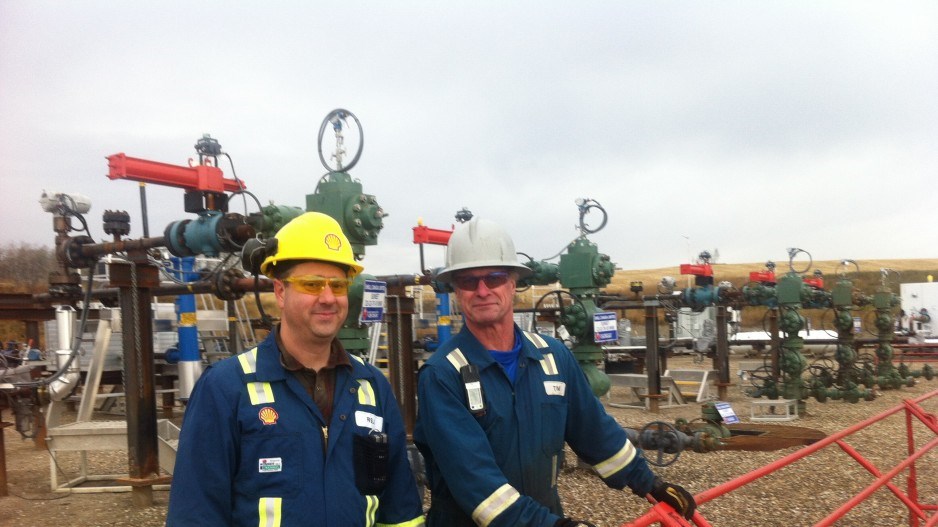Canadian oil and gas companies are expected to spend $32.8 billion this year – a 22% increase over 2021 – though investment in B.C.’s natural gas sector could be more muted than might otherwise be expected due to political and regulatory uncertainties.
A post-pandemic surge in demand and prices for oil and natural gas has oil and gas companies reaping windfalls and upping their investments in new oil and gas wells and infrastructure.
The Canadian Association of Petroleum Producers (CAPP) forecasts $21.2 billion in capital investments in conventional oil and natural gas in 2022 – up from $18.1 billion last year -- and $11.6 billion in Alberta’s oil sands.
CAPP expects investments in B.C.’s oil and gas sector to grow from last year’s $3.4 billion to $4.1 billion in 2022.
Just this week, Pembina Pipeline Corporation (TSX: PPL, NYSE: PBA) announced an $11.4 billion asset merger that consolidates its position in B.C.’s Montney formation. Pembina and Kohlberg Kravis Roberts (KKR) will combine their Western Canadian natural gas assets, including natural gas and natural gas liquids processing in northeastern B.C.
Under the asset merger, Pembina and KKR will combine Western Canadian assets under a new joint venture, Newco, with Pembina owning 60% of the joint venture and KKR owning 40%. The new joint venture will also acquire Energy Transfer Canada, in which KKR held a 49% stake. Energy Transfer Canada owns midstream and processing assets in Alberta.
Pembina and KKR own Veresen Midstream, which has natural gas and natural gas liquids processing systems in B.C. In a news release, Pembina cites “ownership in Veresen Midstream and exposure to increasing LNG-driven volume growth in NEBC” as one of the benefits of the merger. Pembina is a partner in the Haisla First Nation’s Cedar LNG project, which is currently in the BC Environmental Assessment review process.
Investment in B.C.’s upstream sector may be more muted in 2022 than it might otherwise be, CAPP predicts, due to ongoing political and regulatory uncertainties.
CAPP expects Alberta will attract the most investment in 2022 -- $24.5 billion. The association expects $4.1 billion worth of investments in B.C. in 2022.
“With rapidly growing global demand for natural gas translating into multi-year highs in natural gas prices, producers in British Columbia are showing interest in growing their investment in the province,” CAPP says in its forecast.
“However, the ongoing review on royalties paired with the current moratorium on issuing development permits stalled investment in 2021. Investment in the province fell approximately $600 million short of last year’s anticipated $3.9 billion, only reaching $3.4 billion in 2021.”
The B.C. government is in the process of overhauling its tax and royalty regime for oil and natural gas. As part of the review, certain credits, like the deep well drilling credit, may be scrapped or replaced.
A bigger uncertainty for natural gas producers, however, is a general freeze on permitting for a variety of industries, not just natural gas, in Northeastern B.C. as a result of a BC Supreme Court decision last year that found the B.C. government had infringed the treaty rights of the Blueberry River First Nation.
The First Nation successfully argued that decades of resource development and extraction – including natural gas development – has had a cumulative impact on the nation’s rights under Treaty 8.
The B.C. government has put something of a freeze on a variety of activities in Blueberry River First Nation territory in Northeastern B.C., as it works on an agreement with B.C.'s Treaty 8 First Nations on land use that will avoid future infringements.
As a result of last year’s court decision, natural gas drilling declined sharply in latter half of 2021 in B.C.
“This is very concerning,” said Stewart Muir, executive director for Resource Works. “Since July last year, up until early this year, there were no permits issued for gas drilling.”
The BC Oil and Gas Commission (BCOGC) insists there is no moratorium on new natural gas well permitting.
“There is no moratorium,” the BCOGC said in a statement to BIV News. “The province may continue to authorize some activities, but decision-makers must apply caution and scrutiny to applications to make sure they do not authorize activities that further unjustifiably infringe on treaty rights.”
CAPP says the drilling rig counts in B.C. currently sits at half the historical average, “indicating producers are potentially holding off some investment until later in 2022.”
Alberta oil and gas producers and midstream companies have invested billions in B.C. over the past decade, largely driven by the Montney formation’s natural gas liquids – light oil, condensate and propane.
But a nascent LNG industry has also been driving significant investment. Of the $40 billion that LNG Canada is expected to spend on a single LNG project, close to half of that would be in acquisition and development of upstream assets.
A recent IPSOS poll done for Resource Works suggests British Columbians generally support both the industry’s growth and climate action.
The survey of 800 British Columbians found only 7% want no new natural gas development, while 12% support unmitigated growth.
About 35% straddle a middle position in which they say the industry should be allowed to grow “provided action is being taken to reduce greenhouse gas emissions.”
“I think there’s kind of a middle ground position,” Muir said. “They want to see action on greenhouse gas emissions, but they also understand that it’s an industry that should be allowed to grow, as long as action is taken to reduce gas emissions.”




